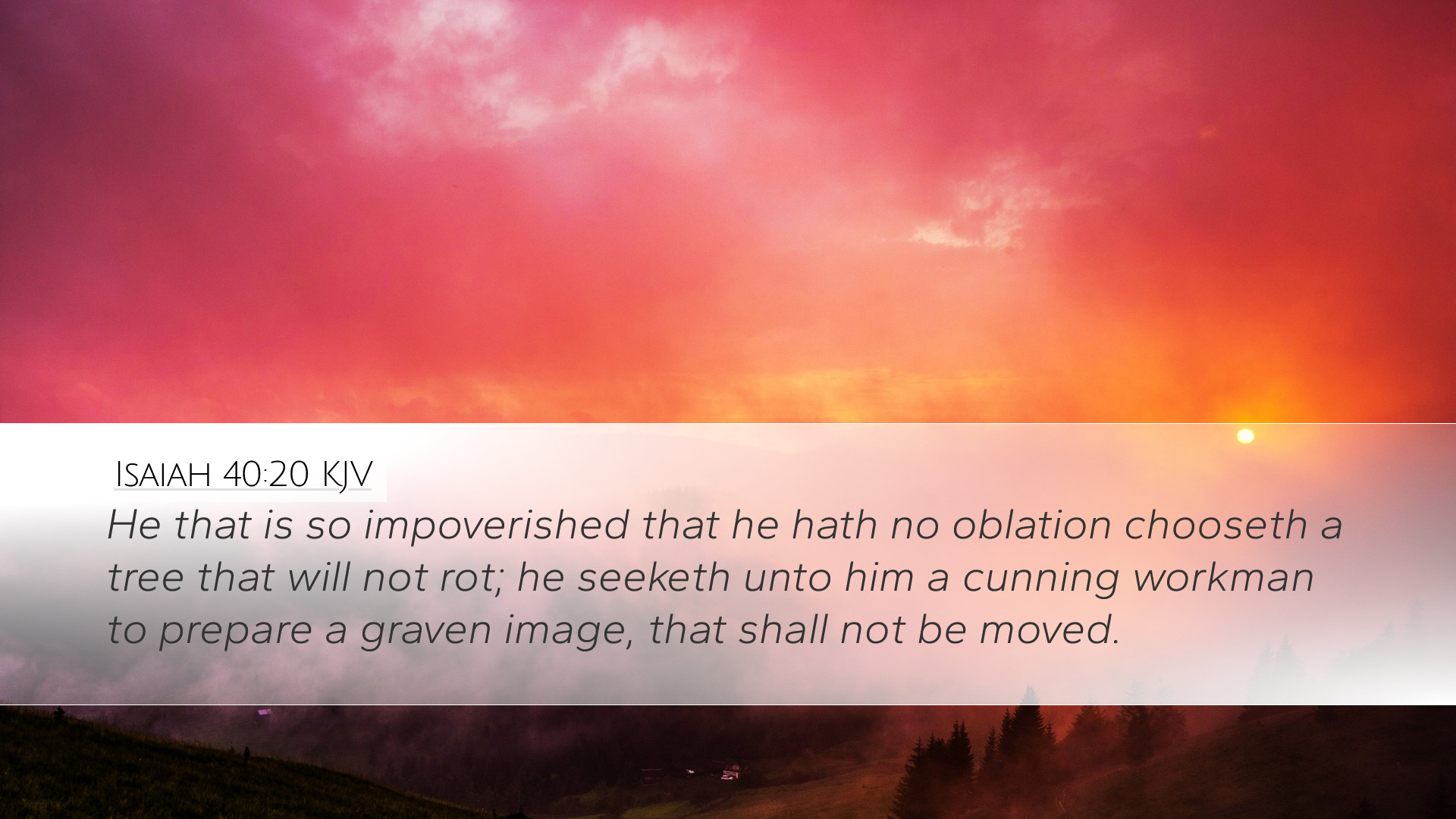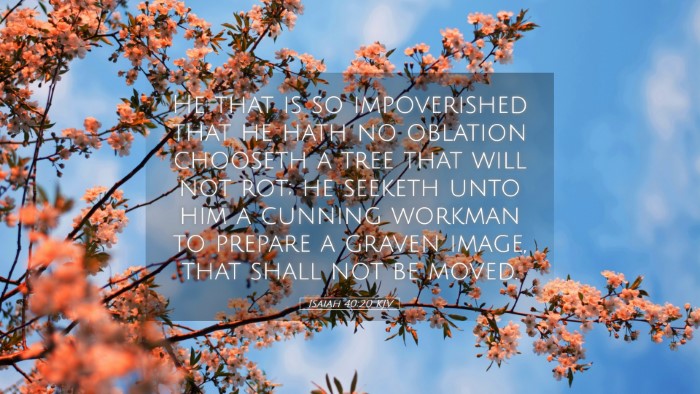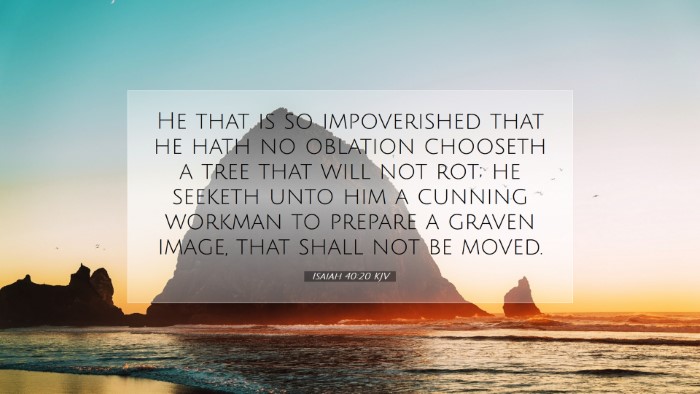Isaiah 40:20 - Commentary Summary
Bible Verse: "He that is so impoverished that he hath no oblation chooseth a tree that will not rot; he seeketh unto him a cunning workman to prepare a graven image, that shall not be moved."
Contextual Overview
Isaiah 40 is a pivotal chapter in the Book of Isaiah, known for its themes of comfort and the sovereignty of God. This particular verse illustrates the desperation of those who turn to idolatry when faced with dire circumstances. The contrast between the greatness of God and the futility of idols is a recurring theme throughout the Scriptures.
Insights from Matthew Henry
Matthew Henry emphasizes the folly of idol-making as a representation of spiritual poverty. He notes that those who are bankrupt in spiritual matters often seek to create their own deities out of desperation. This action not only highlights their lack of understanding but also their misguided attempts to fill a void that only God can satisfy.
- Impoverishment of Spirit: Henry illustrates that the act of choosing a worthless object to worship stems from a deeper spiritual desolation.
- The Choice of Material: The selection of a tree that does not rot symbolizes the temporary and transient nature of earthly things compared to the eternal nature of God.
- Cunning Workmanship: It reflects the human tendency to depend on craftsmanship rather than divine creation, revealing a lack of faith in the Creator.
Insights from Albert Barnes
Albert Barnes comments on the societal implications of this verse, focusing on the cultural practices that lead individuals to idolatry. He posits that the impoverished status of individuals often drives them to seek tangible representations of what they hope will bring them security or satisfaction.
- Cultural Context: Barnes explains that in ancient Israelite culture, the making of idols was prevalent among those who felt abandoned by God. The choice of an impermanent material highlights a tragic irony in seeking permanence in the midst of spiritual insecurity.
- The Remorse of Judgment: This verse serves as a warning to the people of Israel about the futility of their actions and their need to place their hopes in the true God rather than in the works of their own hands.
Insights from Adam Clarke
Adam Clarke offers a detailed exegesis of the verse, highlighting the psychological aspects of idolatry. He suggests that the act of creating an idol is a symptom of deeper existential struggles faced by those who feel abandoned or disenfranchised.
- Symbol of Desperation: Clarke points out that those who are spiritually impoverished feel compelled to seek a representation of divinity, even in the most unworthy forms.
- Irony of Idolatry: The irony lies in the human tendency to create gods from wood while the true God, who is alive and eternal, remains unacknowledged.
- Craftsman's Role: The reference to a cunning workman indicates that there is intent and deceit in the idol-making process, reflecting a deliberate choice to forsake the knowledge of God for a false sense of security.
Theological Reflections
The theological reflections on this verse encourage a deeper understanding of the nature of God in contrast to human-made objects. The act of turning to idols is seen as a product of spiritual bankruptcy, and it effectively portrays the alienation experienced by those who have turned away from true worship.
- Spiritual Poverty: Isaiah 40:20 sheds light on humanity’s tendency to seek out fulfillment in temporary, created things when divine presence seems distant.
- God's Sovereignty: The verse accentuates God's sovereignty over creation, emphasizing that while people craft images, God remains unchallenged in His eternal capacity to provide true security and peace.
Application for Pastors and Theologians
For pastors and theologians, Isaiah 40:20 serves as a poignant reminder of the present-day idolatry that can manifest in various forms, both physical and conceptual. It invites deep reflection on the nature of faith and the essence of what individuals place their trust in.
- Call to Examine Idols: This verse challenges church leaders to help congregants identify modern-day idols—anything that takes precedence over faith in God.
- Encouragement in Dispirited Times: It offers hope and reassurance that God remains sovereign, encouraging individuals to redirect their efforts towards the eternal rather than the transient.
- Responsible Leadership: Pastors are prompted to cultivate an environment where spiritual impoverishment can be addressed, educating congregants on the sufficiency of Christ over earthly desires.
Conclusion
Isaiah 40:20 highlights the perpetual struggle between the divine and the temptation to turn to idols, reflecting the human condition of seeking fulfillment in the created rather than the Creator. Drawing from the insights of established biblical scholars enriches our understanding of this text, ensuring that it remains relevant for spiritual leaders and scholars alike. Ultimately, it calls for a re-examination of faith in God amidst cultural practices that can distract from true worship.


